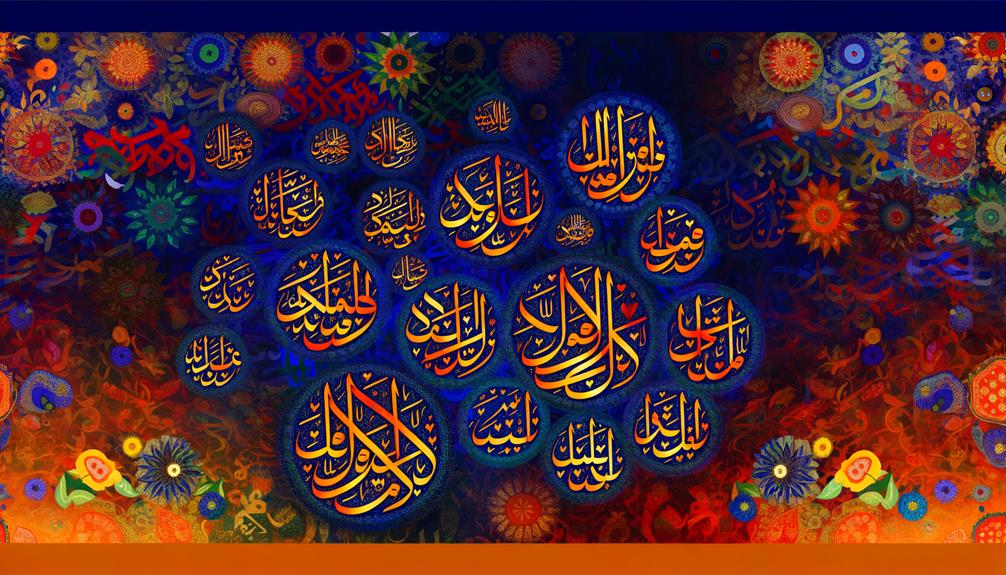Urdu Name Meaning in English
Understanding the meaning of Urdu names in English uncovers a deep connection to cultural heritage and history. For example, Aisha translates to 'alive' or 'living,' while Zain means 'beauty' or 'grace.' These names are selected with care, often involving family and religious leaders.
Historically, they draw from Persian, Arabic, Turkish, and Sanskrit traditions, reflecting the rich history of the Indian subcontinent. When translating, preserving the name's essence and cultural significance is crucial.
Delving into this further will enhance your appreciation of these elaborate cultural layers.

Key Takeaways
- Urdu names often derive from Persian, Arabic, Turkish, and Sanskrit traditions.
- Names like Aisha mean "alive" or "living" in English.
- Hasan translates to "handsome" and Imran to "prosperity."
- Cultural and religious connotations are integral to understanding Urdu names.
- Phonetic spelling ensures pronunciation remains unchanged when translating Urdu names to English.
Importance of Names in Urdu Culture
In Urdu culture, names hold profound significance as they're often imbued with deep cultural, religious, and familial meanings. You'll find that names aren't just labels but reflect an intricate tapestry of heritage and identity. They're chosen with great care, often involving consultations with family elders and religious leaders.
This meticulous process ensures that the name aligns with cultural traditions and religious beliefs. Names may also be selected to honor ancestors, thereby creating a sense of continuity and respect for one's lineage. Additionally, they can be a source of pride, encapsulating virtues, aspirations, or significant historical events.
Understanding this helps you grasp how names function as more than mere identifiers in Urdu culture—they're crucial to personal and communal identity.
Common Urdu Names and Meanings
Exploring typical Urdu names and their meanings unveils a rich tapestry of linguistic beauty, cultural depth, and historical significance. When you dive into these names, you'll uncover layers of meaning that reflect values and traditions.
Here are some common Urdu names and their meanings:
- Aisha: Alive, living
- Zain: Beauty, grace
- Hassan: Handsome, good
- Fatima: Enthralling, one who abstains
- Imran: Prosperity, long-lived
Each name is carefully chosen, often carrying connotations that honor family heritage or religious significance. By comprehending these names, you gain insight into the cultural and emotional landscapes that shape them.
This exploration enriches your appreciation of Urdu's linguistic and cultural diversity.
Historical Origins of Urdu Names
Delving into the historical origins of Urdu names reveals a fascinating interweaving of linguistic influences and cultural exchanges that span centuries.
You'd find that Urdu names are deeply rooted in Persian, Arabic, Turkish, and Sanskrit traditions. This amalgamation reflects the diverse historical interactions within the Indian subcontinent, especially during the Mughal era.
Persian and Arabic names often denote religious and spiritual connotations, mirroring the Islamic influence on the region. Conversely, names derived from Sanskrit connect to the ancient Hindu heritage, resonating with values and attributes esteemed in Indian culture.
Understanding these origins helps you appreciate the cultural and historical layers embedded within each name, offering a richer perspective on identity and heritage.
Translating Urdu Names to English
Translating Urdu names to English involves dissecting their linguistic components to capture their nuanced meanings and cultural significance. You'll need to take into account several factors to maintain accuracy and respect for cultural contexts.
- Phonetic spelling: Ensure the pronunciation remains clear and unchanged.
- Literal translation: Translate word-for-word meanings while retaining essence.
- Cultural context: Understand the cultural and historical background.
- Symbolic meanings: Acknowledge symbolic or religious connotations.
- Language structure: Be mindful of syntax disparities between Urdu and English.
Popular Urdu Names Around the World
Many Urdu names, rich with historical and cultural significance, have gained popularity worldwide due to globalization and the diaspora. You’ll find these names in various countries, reflecting the influence of Urdu-speaking communities. Understanding the meaning behind these names can provide insight into their cultural resonance and aesthetic appeal. Here are some popular Urdu names and their meanings: For example, the name Ayesha is of Urdu origin and means “small one” or “living” in Arabic. Another popular Urdu name, Zainab, means “fragrant flower” in Arabic. The name Mirha is also gaining popularity and means “Allah’s light” in Urdu. Understanding the cultural and linguistic significance of these names can help foster a deeper appreciation for the diversity and richness of Urdu culture. The meaning of Mirha in Urdu reflects the spiritual and symbolic nature of many Urdu names.
| Name | Meaning | Gender |
|---|---|---|
| Aisha | Alive, Living | Female |
| Imran | Prosperity | Male |
| Zara | Princess | Female |
| Hasan | Handsome | Male |
| Noor | Light | Unisex |
These names carry profound meanings, making them appealing across cultures. They encapsulate heritage, identity, and beauty, fostering a deeper connection with one's roots.
Conclusion
In exploring Urdu names, you've exposed a rich tapestry of cultural significance, historical roots, and global resonance. Translating these names to English not only bridges linguistic gaps but also fosters deeper understanding and appreciation.
Isn't it fascinating how a name, so simple yet profound, can encapsulate identity and heritage?
By delving into these names, you've gained insights into a world where every name tells a story, connecting past, present, and future.






